Monday, July 31, 2006
Lame Duck Session On Tap

On the slim chance, given electronic voting skullduggery, that the GOP loses control of Congress in the midterms, a lame duck session has been scheduled to provide for continued Republican opportunities for enacting legislation until January.
Congress is leaving for a month-long recess with so much unfinished business that it's planning a fifth consecutive post-election session, the most since 1935.
Another lame-duck session raises the prospect that important business could be completed by lawmakers who have been rejected by voters. If Republicans lose control of Congress, they'd still direct the agenda until January, when lawmakers are sworn in....
Political analysts say lame-duck sessions aren't efficient. Lawmakers return "tired and distracted," says Norman Ornstein, co-author of a new book on Congress, "The Broken Branch."
The House of Representatives and Senate usually adjourn near the end of each two-year term well before Election Day to give lawmakers time to campaign.
Congress changed its schedule in 1935 to minimize the need for post-election meetings. Ratification of the 20th Amendment to the Constitution moved the start of a new term from March to January.
Doubtlessly, should the Democrats come to power, the Republicans will want to take care of some important matters that would not likely fly in the aftermath of a shakeup on Capitol Hill.
Authorization for war with Syria and Iran, anyone?
Sunday, July 30, 2006
USAID Creative Accounting On Iraq Reconstruction Projects Alleged

Cynical folks have harbored suspicions that the ill-fated U.S. endeavor in Iraq may have been motivated -- in part at least -- to provide a fertile ground for boondoggles by large government contractors.
This story will not allay any conjectures along such lines:
The State Department agency in charge of $1.4 billion in reconstruction money in Iraq used an accounting shell game to hide ballooning cost overruns on its projects there and knowingly withheld information on schedule delays from Congress, a federal audit released late Friday has found.
The agency hid construction overruns by listing them as overhead or administrative costs, according to the audit, written by the Special Inspector General for Iraq Reconstruction, an independent office that reports to Congress, the Pentagon and the State Department.
Called the United States Agency for International Development, or A.I.D., the agency administers foreign aid projects around the world. It has been working in Iraq on reconstruction since shortly after the 2003 invasion. (...)
The hospital's construction budget was $50 million. By April of this year, Bechtel had told the aid agency that because of escalating costs for security and other problems, the project would actually cost $98 million to complete. But in an official report to Congress that month, the agency "was reporting the hospital project cost as $50 million," the inspector general wrote in his report.
The rest was reclassified as overhead, or "indirect costs." According to a contracting officer at the agency who was cited in the report, the agency "did not report these costs so it could stay within the $50 million authorization."
The inspector general also found that the agency had not reported known schedule delays to Congress. On March 26, 2006, Bechtel informed the agency that the (Basra) hospital project was 273 days behind, the inspector general wrote. But in its April report to Congress on the status of all projects, "U.S.A.I.D. reported no problems with the project schedule."
Friday, July 28, 2006
Utilities Ante Up Again For A Global Warming Debunker

Providing a public face for the denial of scientific evidence of global warming -- enabling cover for the bespoiling of the planet for corporate purposes -- wouldn't be many peoples' idea of right livelihood.
But someone can always be found to do it for the money:
Coal-burning utilities are passing the hat for one of the few scientists skeptical that human activity is causing harmful global warming.
Patrick J. Michaels -- Virginia's state climatologist, a University of Virginia professor and senior fellow at the libertarian Cato Institute -- told business leaders in the West last year that he was running out of money for work. So last week, a Colorado utility launched a campaign to help him, raising at least $150,000 in donations and pledges.
The Intermountain Rural Electric Association of Sedalia, Colo., gave Michaels $100,000 and started the fundraising drive, said General Manager Stanley Lewandowski. He said one company plans to give $50,000 and a third plans to give Michaels money next year.
"We cannot allow the discussion to be monopolized by the alarmists," Lewandowski wrote in a July 17 letter to 50 other utilities. He also called for a counterattack on "alarmist" scientists and former vice president Al Gore's movie about global warming, "An Inconvenient Truth."
Michaels and Lewandowski are open about the money and see no problem. Some top scientists and environmental advocates call it a clear conflict of interest. Others view it as the type of lobbying common on many divisive issues.
Others view the global warming debunkers as being more dangerous than holocaust debunkers.
Both odious types use sophistry to push plainly untenable points of view. The global warming "skeptics", however are participating in an effort that will have disastrous long range consequences upon the future of mankind.
James Hanson -- one of the U.S. government's top climate experts -- in an extensive article debunks the debunkers, and lays out the real scientific situation for those who may still mistakenly believe that there is some scientific debate about whether global warming exists.
Hanson specifically addresses the propagandizing of the American people by those who put short term profits over the welfare of their children and grandchildren:
Why are the same scientists and political forces that succeeded in controlling the threat to the ozone layer now failing miserably to deal with the global warming crisis? Though we depend on fossil fuels far more than we ever did on CFCs, there is plenty of blame to go around. Scientists present the facts about climate change clinically, failing to stress that business-as-usual will transform the planet. The press and television, despite an overwhelming scientific consensus concerning global warming, give equal time to fringe "contrarians" supported by the fossil fuel industry. Special interest groups mount effective disinformation campaigns to sow doubt about the reality of global warming. The government appears to be strongly influenced by special interests, or otherwise confused and distracted, and it has failed to provide leadership. The public is understandably confused or uninterested.
I used to spread the blame uniformly until, when I was about to appear on public television, the producer informed me that the program "must" also include a "contrarian" who would take issue with claims of global warming. Presenting such a view, he told me, was a common practice in commercial television as well as radio and newspapers. Supporters of public TV or advertisers, with their own special interests, require "balance" as a price for their continued financial support. Gore's book reveals that while more than half of the recent newspaper articles on climate change have given equal weight to such contrarian views, virtually none of the scientific articles in peer-reviewed journals have questioned the consensus that emissions from human activities cause global warming. As a result, even when the scientific evidence is clear, technical nit-picking by contrarians leaves the public with the false impression that there is still great scientific uncertainty about the reality and causes of climate change.
Thursday, July 27, 2006
Magnetic Car Stickers Are Not Enough

Republicans are very vocal in their support of the military. However, the GOP-controlled Congress doesn't support them by appropriating enough funds to properly equip them for battle.
Up to two-thirds of the Army's combat brigades are not ready for wartime missions, largely because they are hampered by equipment shortfalls, Democratic lawmakers said Wednesday, citing unclassified documents.
In a letter to President Bush, Rep. Ike Skelton of Missouri, the top Democrat on the House Armed Services Committee, said that "nearly every non-deployed combat brigade in the active Army is reporting that they are not ready" for combat. The figures, he said, represent an unacceptable risk to the nation.
At a news conference, other leading Democrats said that those strategic reserve forces are critically short of personnel and equipment.
"They're the units that could be called upon or would be called upon to go to war in North Korea, Iran, or any other country or region," said Rep. John Murtha, D-Pa., a decorated Marine who has called for a timetable for withdrawal from Iraq.
In a statement released late Wednesday, the Army chief of staff, Gen. Peter J. Schoomaker, said much has been asked of the Army during the nearly five years the U.S. has been at war.
"I have testified to the facts about our readiness and I remain concerned about the serious demands we face," said Schoomaker, adding that the Army needs more than $17 billion in 2007 and up to $13 billion a year until two or three years after the war ends. (...)
Schoomaker traced the problem's origin to entering the Iraq war in 2003 with a $56 billion shortfall in equipment. The Army managed the situation by rotating in fresh units while keeping the same equipment in Iraq. Over time, he said, the equipment has worn out without sufficient investment in replacements.
Wednesday, July 26, 2006
Unrealistic Expectations Of Maliki's Subservience
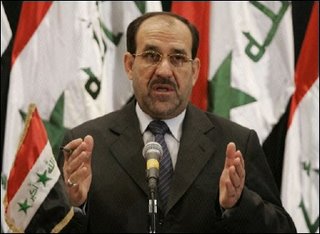
The Democrats are proving here that they don't understand Iraq much better than does their Republican counterparts in Congress.
Congressional Democrats say Iraqi Prime Minister Nouri al-Maliki should condemn the Hezbollah attacks on Israel if he wants to deliver an address to a joint session of Congress today.
Some members are considering skipping the planned speech, saying Mr. al-Maliki's July 19 remarks urging the world "to take quick stands to stop the Israeli aggression" are "troubling" because Iraq is supposed to be a U.S. ally.
"No matter how politically expedient he thinks it may be: To stand with America, you have to stand against terrorism," said Sen. Charles E. Schumer, New York Democrat. "Before he speaks in front of the Congress and the American people, there is a very simple question we are asking the prime minister today: Which side is he on when it comes to the war on terror?"
Schumer wouldn't like the answer he would receive if he were to personally ask Maliki to choose between his Shiite brethren and the USA.
House Minority Leader Nancy Pelosi of California and at least 20 other Democrats expressed similar worries. (...)
Mrs. Pelosi said the Iraqi leader's comments are "unacceptable," adding, "Unless Mr. Maliki disavows his critical comments of Israel and condemns terrorism, it is inappropriate to honor him with a joint meeting of Congress."
Sounds like Ms. Pelosi and the other 20 Dems have been drinking from President Bush's "let's spread democracy to the Middle East" kool-aid.
"It is clear that their foreign policy goals are at odds with those of the United States," read the letter , signed by 20 Democrats (sent to House Speaker J. Dennis Hastert urging him to cancel Maliki's address to Congress unless he retracts his stated opinion).
What do these fools think? The democratically elected government in Iraq is Shiite-led, and close to the Iranians. It is dangerously wishful thinking to imagine that the Iraqi foreign policy goals would not be at odds with the United States.
The Democrats are way overestimating in this case the traditional capability of the U.S. to install compliant governments in countries that are important to our national interest.
Tuesday, July 25, 2006
Robin Hood In Reverse

The administration of the rich, by the rich, and for the rich, is making a pretty audacious move here:
The federal government is moving to eliminate the jobs of nearly half of the lawyers at the Internal Revenue Service who audit tax returns of some of the wealthiest Americans, specifically those who are subject to gift and estate taxes when they transfer parts of their fortunes to their children and others.
The administration plans to cut the jobs of 157 of the agency's 345 estate tax lawyers, plus 17 support personnel, in less than 70 days. Kevin Brown, an I.R.S. deputy commissioner, confirmed the cuts after The New York Times was given internal documents by people inside the I.R.S. who oppose them. (...)
(S)ix I.R.S. estate tax lawyers whose jobs are likely to be eliminated said in interviews that the cuts were just the latest moves behind the scenes at the I.R.S. to shield people with political connections and complex tax-avoidance devices from thorough audits.
Sharyn Phillips, a veteran I.R.S. estate tax lawyer in Manhattan, called the cuts a "back-door way for the Bush administration to achieve what it cannot get from Congress, which is repeal of the estate tax." (...)
Over the last five years, officials at both the I.R.S. and the Treasury have told Congress that cheating among the highest-income Americans is a major and growing problem.
"This is not a game the poor will win, but the rich will," said John Hruska, another I.R.S. estate tax lawyer in New York who, like Ms. Phillips, is active in the National Treasury Employees Union, which represents I.R.S. workers.
Colleen M. Kelley, the national union president, said: "If these lawyers are not there to audit the gift and estate tax returns, then a lot of taxes that should be paid will go uncollected, and that impacts every taxpayer who is paying their fair share."
It never fails to amuse me to see people who are not wealthy support the Republican Party, the economic policies of which are geared toward the rich and actively hostile to the middle class.
Monday, July 24, 2006
ABA Report Criticizes Bush Signing Statements
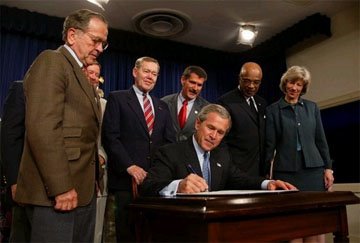
President Bush's habit of issuing dubious "signing statements" has been a frequent topic here. See: Bush "Signing Statement" Allows Him To Circumvent Ban On Torture, Patriot Act Signing Statement Skullduggery, Bush Reserves Right To Disobey More Than 750 Laws, and New Assertiveness By Congress and the Courts.
A new ABA report picks up where I left off.
A panel of legal scholars and lawyers assembled by the American Bar Association is sharply criticizing the use of "signing statements" by President Bush that assert his right to ignore or not enforce laws passed by Congress.
In a report to be issued today, the ABA task force said that Bush has lodged more challenges to provisions of laws than all previous presidents combined.
The panel members described the development as a serious threat to the Constitution's system of checks and balances, and they urged Congress to pass legislation permitting court review of such statements. (...)
The report seemed likely to fuel the controversy over signing statements, which Bush has used to challenge laws including a congressional ban on torture, a request for data on the USA Patriot Act, whistle-blower protections and the banning of U.S. troops in fighting rebels in Colombia. (...)
Bush has vetoed only one bill since taking office, a bill approved by Congress last week relaxing his limits on federal funding for human embryonic stem cell research. But he has on many occasions signed bills, then issued statements reserving the right not to enforce or execute parts of the new laws, on the grounds that they infringe on presidential authority or violate other constitutional provisions. (...)
Task force members said the nature of the challenges has also changed under Bush, with many objections being lodged under the "unitary executive" theory, the idea that congressional checks on the president's power are limited.
If the president has constitutional problems with a bill, the task force said, he should convey those concerns to Congress before it reaches his desk. The panel said signing statements should not be a substitute for vetoing bills the president considers unconstitutional.
"The President's constitutional duty is to enforce laws he has signed into being unless and until they are held unconstitutional by the Supreme Court or a subordinate tribunal," panel members wrote. "The Constitution is not what the President says it is."
No kidding, considering what President Bush says it is:
"Stop throwing the Constitution in my face," Bush screamed back. "It's just a goddamned piece of paper!"
Sunday, July 23, 2006
Cheney/Rumsfeld Lebanon Skullduggery
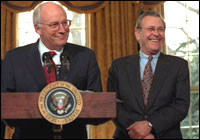
From Juan Cole:
The Bush administration's perceived economic and geopolitical interests ... overlap strongly with Israel's perceived security interests, with both benefiting from an Israeli destruction of Hizbullah. It is not impossible that the US Pentagon urged the Israelis on in this endeavor. They certainly knew about and approved of the plan.
What is scary is that Cheney and Rumsfeld don't appear to have let W. in on the whole thing. They told him that Bashar al-Asad of Syria stirred up a little trouble because he was afraid that Iraq the Model and the Lebanese Cedar Revolution might be such huge successes that they would topple him by example (just as, after Poland and the Czech Velvet Revolution, other Eastern European strongmen fell). (Don't fall down laughing at the idea of Iraq and Lebanon as Republican Party success stories; people in Washington, DC, cocoon a lot and have odd ideas about the way the world is.) So, Bush thought, if that is all that is going on, then someone just needs to call al-Asad and reassure him that we're not going to take him out, and get him to rein in Hizbullah. And then the war would suddenly stop. No one told Bush that this war was actually an Israeli war of choice and that al-Asad had nothing to do with it, that, indeed, it could only happen because al-Asad is already irrelevant.
That is why Administration hopes of using the Israeli attempt to destroy Hezbollah as a wedge to convince Syria to give up rejectionism and detach itself from Iran are crazy.
Syria is not going to give up its stance toward Israel unless it at the very least gets back the occupied Golan Heights. That is non-negotiable for Damascus. Since the Israeli Right is diehard opposed to making that deal, Israel will go on occupying part of Syrian soil. Syria cannot accept that outcome. Likewise, the Allawi regime faces a powerful challenge from the Sunni Muslim Brotherhood. The high Baath officials would be afraid that if they made peace with Israel and got nothing out of it for Syria, there would be a mass popular Islamist uprising. A separate peace that leaves the Palestinians to the Israelis' tender mercies would also stick in the craw of the Syrian public. The administration plan will fail.
(...)
The chief outcome of the "war on terror" has been the proliferation of asymmetrical challengers. Israel's assault on the very fabric of the Lebanese state seems likely to weaken or collapse it and further that proliferation. Since asymmetrical challengers often turn to terrorism as a tactic, the "war on terror" has been, at the level of political society below that of high politics and the state, the most efficient engine for the production of terrorism in history.
Saturday, July 22, 2006
Custer Battles Set Up Shell Companies To Get Around U.S. Ban
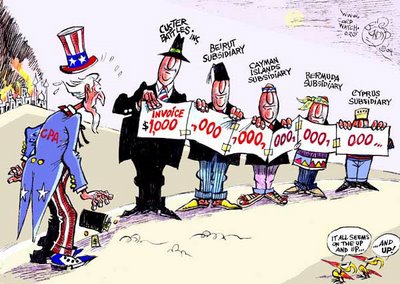
The defense contractor Custer Battles, which has been banned from receiving U.S. contracts in Iraq, is back in the news today.
Two former Pentagon officials, including an acting secretary of the Navy, have been accused of scheming with a banned American contractor to get lucrative rebuilding contracts in Iraq, The Associated Press has learned.
The contracting firm, Custer Battles LLC, was suspended two years ago by the military for submitting millions of dollars in fake invoices.
The charges come in a sealed federal lawsuit, a copy of which was obtained by The AP. It was filed by two whistleblowers - one of whom won a $10 million judgment in another suit when a federal jury agreed that Custer Battles had swindled the government.
The current suit names former acting Navy Secretary Hansford T. Johnson, former acting Navy Undersecretary Douglas Combs, and Custer Battles LLC officials including founders Scott Custer and Mike Battles, who were barred in 2004 after billing the government for work that was never done and for padding invoices by much as 100 percent. (...)
The new lawsuit contends Custer and Battles, both Army veterans with Washington political connections, tried to get around the suspension order by plotting with Johnson and Combs "to set up sham companies (thereby) concealing their ownership and control of those entities."
According to the suit filed in Virginia, the shell companies committed other illegal acts, including selling weapons on the Iraqi black market, creating a dangerous possibility that "insurgents could buy them and use them to attack U.S. soldiers."
Friday, July 21, 2006
HHS Chief Leavitt's "Charitable" Tax Shelter
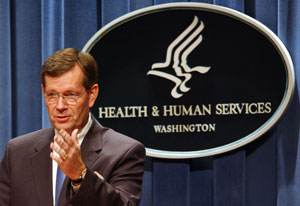
The generosity of some people is truly heartwarming:
Health and Human Services Secretary Mike Leavitt and his relatives have claimed millions of dollars in tax deductions through a type of charitable foundation they created that until recently paid out very little in actual charity, tax records show.
Instead, much of the foundation's money has been invested or lent to the family's business interests and real estate holdings, or contributed to the Leavitt family genealogical society. (...)
While Mike Leavitt alone has claimed about $1.2 million in tax write-offs since 2000, the foundation gave away only $49,000 in 2002 and $52,000 the next year, according to tax returns and other documents filed by the foundation. Meanwhile, the foundation's assets have been used for a $332,000 loan to Leavitt Land and Investment Inc., in which the secretary owns a significant stake, and other secured loans for insurance and real estate deals, said Alan A. Jones, a trustee of the organization.
Leavitt Land and Investment, in turn, extended an interest-free loan to Leavitt in 2002 valued at more than $250,001, according to a recent financial disclosure. (...)
The tax structure used to create the foundation is called a Type III supporting organization. The Internal Revenue Service has said the category is rife with abuse, designating "supporting organizations" this year as one of its "Dirty Dozen" top tax scams, along with Internet identity theft and offshore banks. Use of the tax structure could be significantly reined in under a tax provision that was inserted into pension legislation passed by the Senate and now under negotiation with the House.
Thursday, July 20, 2006
A Bellwether For The Prospects Of Politicians With Dodgy Associates
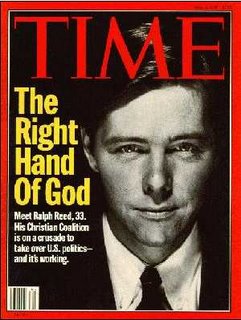
It seems like the chickens are coming home to roost everywhere these days.
Including for politicians publicly linked to the "culture of corruption" in Washington:
While political corruption has failed so far to take root as a national issue, the defeat of scandal-stained Ralph Reed in Georgia on Tuesday showed that federal investigators could tip some key House and Senate races this fall, according to party strategists.
Reed, a former top campaign official for President Bush and executive director of the Christian Coalition, lost the Republican primary for lieutenant governor after getting pounded by his opponent for his close and profitable relationship with convicted lobbyist Jack Abramoff, the central figure in an unfolding money-for-favors scandal. Reed was the first electoral victim of political corruption probes -- but officials in both parties said he probably won't be the last.
Republicans worry that more than six candidates for the House and Senate could be hurt by Justice Department investigations, the courts and revelations in the Abramoff affair. Topping the list are Rep. Robert W. Ney (R-Ohio) and Sen. Conrad Burns (R-Mont.), both bruised by Abramoff connections and facing tough races. (...)
Three months from the election, the political scandals in Washington are not resonating broadly as a major issue in a campaign dominated by Iraq and high gasoline prices. A series of public polls show corruption ranks near the bottom when voters are asked about the most important issues in this campaign. In a Washington Post-ABC News poll taken in May, 2 percent of voters listed ethics and corruption as their top concern. (...)
Other members threatened by corruption charges include Republican Reps. Jerry Lewis (Calif.), John T. Doolittle (Calif.) and Richard W. Pombo (Calif.). A court ruling could force former majority leader Tom DeLay (R-Tex.) back into the race in Texas's 22nd District, a potential boon for Democrats. Even though DeLay resigned and wanted his name off the ballot, the court ruled it must remain. DeLay has appealed.
Wednesday, July 19, 2006
Bush Obstructed Justice Dept. Investigation Into NSA Program
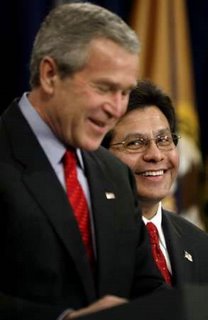
This really doesn't look good for President Bush.
A Watergate-type obstruction by the chief executive is pretty serious stuff.
Attorney General Alberto Gonzales testified before the Senate Judiciary Committee (yesterday) that President Bush personally halted an internal Justice Department investigation into whether Gonzales and other senior department officials acted within the law in approving and overseeing the administration's domestic surveillance program.
The investigation, by the Justice Department's Office of Professional Responsibility, was halted when lawyers who were going to conduct the investigation were denied the security clearances that would have allowed them to view classified documents related to the surveillance program. President Bush made the decision to deny the security clearances for the investigators, Gonzales said in his testimony. (...)
The statement by Gonzales stunned some senior Justice Department officials, who were led to believe that Gonzales himself had made the decision to deny the clearances after consulting with intelligence agencies whose activities would be scrutinized, a senior federal law enforcement official said in an interview. (...)
A senior Justice official said that the refusal to grant the clearances was "unprecedented" and questioned whether the clearances were denied because investigators might find "misconduct by those who were attempting to defeat" the probe from being conducted. The official made the comments without knowing that Bush had made the decision to refuse the clearances. (...)
Michael Shaheen, who headed the OPR from its inception until 1997, said in a telephone interview in May that his staff "never, ever was denied a clearance" and that OPR had conducted numerous investigations involving the activities of attorneys general. "No attorney general has ever said no to me," Shaheen said. (...)
The investigation was launched in January by the Justice Department's Office of Professional Responsibility -- a small ethics watchdog set up in 1975 after department officials were implicated in the Watergate scandal. OPR investigates "allegations of misconduct involving department attorneys that relate to the exercise of their authority to investigate, litigate, or provide legal advice," according to the office's policies and procedures. (...)
"It was the president of the United States himself who prevented this investigation from going forward. In obstructing the investigation, he was protecting the people around him, and not protecting the Constitution," (Rep. Maurice Hinchey, D-N.Y.) said.
Hinchey also asserted that "Congress has been complicit" with the administration in "disregarding the Constitution by not conducting its own inquiry into the matter: This has been a rubber-stamp Congress that has not stood up to the administration and for the separation of powers provisions in the Constitution," he said.
Tuesday, July 18, 2006
FBI Punishment Of Whistleblower Documented

The FBI apparently cares more about maintaining its insular culture than for keeping agents with the necessary skills to advance the Bureau's mission in the "war on terror."
They don't like it when one of their own goes outside the chain of command to seek a resolution to a problem.
The Justice Department has concluded there is "reasonable cause" to believe that senior FBI officials retaliated against the bureau's highest-ranking Arabic speaker for complaining that he was cut out of terrorism cases despite his expertise.
An internal investigation by the department's Office of Professional Responsibility found "sufficient circumstantial evidence" that Special Agent Bassem Youssef was blocked from a counterterrorism assignment in 2002 after he and U.S. Rep. Frank R. Wolf (R-Va.) met with FBI Director Robert S. Mueller III to discuss Youssef's complaints.
Mueller had approved a transfer for Youssef just days before the meeting, but it never occurred and Youssef was never informed of Mueller's decision, according to the report. Investigators also said the FBI "has provided no rationale" for its failure to promote Youssef, although one former senior FBI manager said Mueller was "appalled" that Youssef had complained to a congressman about his treatment.
"We found both the awareness of senior management and the timing of the failure to implement the placement to be circumstantial evidence of retaliation," the report said.
The FBI declined to comment, citing an ongoing lawsuit by Youssef alleging discrimination based on national origin.
The 12-page report, dated last month and provided to The Washington Post yesterday by the office of Sen. Charles E. Grassley (R-Iowa), represents a rare endorsement of a whistle-blower's allegations by the Justice Department's internal review office. It also represents another setback for the FBI as it struggles to attract Arabic speakers and informants in its fight against Islamic extremists.
"Because of this retaliation, we lost four years of expertise for the war on terror from a highly qualified Arab-American agent," Grassley said in a statement.
Youssef, who served as FBI legal attache in Saudi Arabia for four years, earned raves for his work on the Khobar Towers bombing and other investigations, including praise for his "very, very high performance" by former FBI director Louis J. Freeh, according to court testimony and the report.
Youssef, a naturalized U.S. citizen who was born in Egypt, says his expertise in Arabic, terrorism and Middle Eastern issues was ignored after the Sept. 11, 2001, attacks. He began making formal complaints after being assigned to a budget unit in February 2002. He was later transferred to a unit that processed documents taken from Afghanistan and other overseas locations.
Youssef's attorney, Stephen M. Kohn, said his client has remained in the documents section ever since. Kohn said the OPR report is troubling because it indicates "the FBI is playing games with national security after 9/11."
Monday, July 17, 2006
Corruption Rampant In Iraq's Oil Industry

The United States is calling attention to widespread corruption in Iraq's oil industry.
U.S. Comptroller General David M. Walker told Congress last week that "massive corruption" and "a lot of theft going on" in Iraq's government-controlled oil industry is hampering the country's ability to govern itself. (...)
Walker, who heads the Government Accountability Office, made his remarks at a House Government Reform subcommittee meeting last Tuesday called to examine implementation of the Bush administration's 2005 "National Strategy for Victory in Iraq." He said one of the failures of the U.S. program was related to the prewar assumption that Iraq would be able to pay for its reconstruction "in large part through oil revenues."
He said about 10 percent of Iraq's refined fuels and 30 percent of its imported fuels are being stolen. (...)
Another GAO official, Joseph Christoff, director of international affairs and trade, pointed out that the Iraqi budget is paying for "what some could contend to be a bloated bureaucracy, primarily because oftentimes you don't know who is working in the different ministries -- there are ghost employees." (...)
(James Jeffrey of the State Department's Bureau of Near Eastern Affairs) said the reconstruction program, which involved the Defense Department, the State Department and the Agency for International Development, was, at $21.9 billion, "the largest . . . since the Marshall Plan." He said that prewar assumptions that "there would be a permissive security environment that would allow reconstruction to go forward" turned out to be wrong along with the estimate "that the Iraqi government would make important contributions to the reconstruction effort." (...)
But "without security," he said, "you really can't do anything or enough on the political and economic tracks. However . . . the solution to the security situation is not military but political." (...)
The report concludes that neither the Defense Department nor Congress "can reliably determine the costs of the war, nor do they have details on how appropriated funds are being spent or historical data useful in considering future funding needs." (...)
The Congressional Budget Office last week released its estimate of potential spending requirements for Iraq in the fiscal years 2007 to 2016 based on scenarios where there was either a rapid or slow drawdown of U.S. forces. In the case of rapid withdrawal -- troops out by 2009 -- the CBO estimated an additional $166 billion would be needed for military operations, on top of $290 billion already allocated. For a slower withdrawal, where 40,000 troops stay through 2016, it would cost $368 billion, said the CBO.
Sunday, July 16, 2006
Midterm Elections May Result In Surprises, Says Brookings Fellow
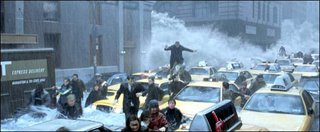
Goopers have been repeating the old axiom that "all politics is local" to counter speculation that President Bush's problems may have negative repercussions upon Republicans in the midterms.
Thomas Mann of the Brookings Institute today presents the idea that the conventional wisdom may fail this year:
When there's no strong national issue at stake, local forces (a district's partisan makeup, the incumbent's reputation, the challenger's resources, etc.) dominate congressional elections. But a sharply negative nationwide referendum on the party in power -- causing a national vote swing of five percentage points or more -- buffeted local factors in the 1946, 1958, 1966, 1974, 1982 and 1994 midterm elections, producing losses of 26 to 56 seats.
In each of those elections, changes in the national vote were not distributed evenly across districts. The party losing ground found itself besieged in districts previously thought to be safe, where the average swing was double or more the national swing.
The new pattern of uncompetitiveness that developed after the 1994 Republican landslide has not been tested by a surly electorate. The Democrats' hopes rest on intense public unhappiness with Bush and the GOP -- and enough districts in play -- to allow them to pick up the 15 seats they need to become the majority party.
Mann offers a prediction:
(M)y own reading is that the odds favor a Democratic takeover of the House. The 15 seats that the party needs for a bare majority is well below the range of minority-party gains in past tidal-wave elections. The national winds blowing against the GOP are strong and have not diminished over the past nine months. Credible progress on the ground in Iraq before November is implausible. The public's harsh evaluation of the president's performance on the economy is unlikely to be reversed by Election Day. Prospects for significant legislative achievements in the remaining months of this Congress are remote. Enough seats will be in play (including some that Republicans carried in 2004 with more than 60 percent of the vote) to allow Democrats to gain majority status in the House.
Prospects for a Democratic majority in the Senate are less bright, given the limited number of Republican seats in play. But even here, a national tide could tip all of the close races in the same direction, allowing the Democrats to hold all their threatened seats and to win the six Republican seats they need to take control.
Midterm prospects may not be as grim for the Republicans as Mann predicts.
The Brookings Fellow does not take into account electronic voting skullduggery in his analysis.
Nor does he factor in a conveniently-timed major war breaking out in the Middle East.
Saturday, July 15, 2006
Stem Cell Research Skullduggery

If the anti-stem cell research people had a valid argument, they wouldn't need to resort to blatant misrepresentation of scientific facts.
With just days to go before the Senate is scheduled to vote on a hotly anticipated bill that would loosen President Bush's restrictions on human embryonic stem cell research, both sides of the scientifically and ethically charged issue have ramped up their publicity machines and attacks on each other....
Yesterday ... the journal Science published a letter by three researchers documenting apparently significant misstatements made by a leader in the movement to block the bill.
The legislation, already passed by the House, would for the first time allow scientists to use federal funds to conduct research on new colonies of the medically promising cells, which are controversial because human embryos must be destroyed to obtain them.
The bill would override rules put in place by Bush five years ago that restrict federal funding to research on only those embryonic stem cells that were in existence as of August 2001. That policy is aimed at protecting human embryos, but it has been widely decried by researchers and patient groups as a roadblock to the development of treatments for a range of diseases.
The letter to the journal focused on David A. Prentice, a scientist with the conservative Family Research Council. Prentice has been an adviser to Sen. Sam Brownback (R-Kan.) -- a leader in the charge to maintain tight restrictions on the research -- and an "expert source" often cited by opponents of embryonic stem cell research.
Prentice has repeatedly claimed that adult stem cells, which can be retrieved harmlessly from adults, have at least as much medical potential as embryonic cells. He often carries a binder filled with references to scientific papers that he says prove the value of adult stem cells as treatments for at least 65 diseases.
In the letter to Science, however, three researchers went through Prentice's footnoted documentation and concluded that most of his examples are wrong.
"Prentice not only misrepresents existing adult stem cell treatments but also frequently distorts the nature and content of the references he cites," wrote Shane Smith of the Children's Neurobiological Solutions Foundation in Santa Barbara, Calif.; William B. Neaves of the Stowers Institute for Medical Research in Kansas City, Mo.; and Steven Teitelbaum of Washington University in St. Louis....
All told, the scientists concluded, there are only nine diseases that have been proved to respond to treatment with adult stem cells.
"By promoting the falsehood that adult stem cell treatments are already in general use for 65 diseases and injuries, Prentice and those who repeat his claims mislead laypeople and cruelly deceive patients," the scientists wrote.
Friday, July 14, 2006
Former CIA Officer Plame Sues Cheney, Libby, and Rove

The discovery phase of this action (if it ever gets that far) may provide some insights into the "intelligence failures" that led to the ill-fated U.S. endeavor in Iraq.
Former CIA officer Valerie Plame and her husband, former ambassador Joseph C. Wilson IV, filed a lawsuit yesterday against Vice President Cheney, presidential adviser Karl Rove and former vice presidential aide I. Lewis "Scooter" Libby, accusing the three of violating their constitutional rights in retaliation for Wilson's criticism of President Bush.
Plame and Wilson say that, after Wilson accused Bush of twisting intelligence about Iraq's pursuit of weapons of mass destruction, Cheney, Rove and Libby conspired to "discredit, punish and seek revenge against the plaintiffs that included, among other things, disclosing to members of the press Plaintiff Valerie Plame Wilson's classified CIA employment." ...
(L)egal analysts said the suit could open new avenues for extracting information from the administration, because Plame and Wilson could conduct discovery if the U.S. District Court in Washington lets the suit proceed.
Plame and Wilson might be entitled to demand documents from Cheney and others, as well as to require them to sit for sworn depositions, much as President Bill Clinton had to answer questions under oath in Paula Jones's sexual harassment lawsuit.
The full 23-page complaint is here. (pdf)
Thursday, July 13, 2006
Indian Tribe Names Abramoff and Reed In Lawsuit
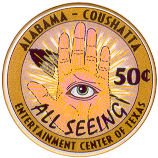
An Indian tribe which was forced to shut down it's casino operation after being a target of Jack Abramoff's political skullduggery is fighting back in federal court.
A Texas Indian tribe filed a federal lawsuit Wednesday alleging ex-lobbyist Jack Abramoff, former Christian Coalition leader Ralph Reed and their associates engaged in fraud and racketeering to shut down the tribe's casino.
The Alabama-Coushatta tribe of Livingston, Texas, alleged the defendants defrauded the tribe, the people of Texas and the Legislature to benefit another of Abramoff's clients -- the Louisiana Coushatta tribe -- and "line their pockets with money."
"Ultimately, the defendants' greed and corruption led to the Alabama-Coushatta tribe permanently shutting its casino. The funding for economic programs evaporated, over 300 jobs were lost in Polk County and the Alabama-Coushatta tribe has spent years struggling to recover and revitalize its economy through other means," the tribe said in its lawsuit....
The lawsuit also names Abramoff's ex-business partner Michael Scanlon, a former aide to former Rep. Tom DeLay, R-Sugar Land; Neil Volz, a former aide to Rep. Bob Ney, R-Ohio; and Jon Van Horne, Abramoff's former colleague at his law and lobbying firm, Greenberg Traurig....
The tribe did not specify how much money it is seeking in the lawsuit. Petti said the tribe is asking for the amount of revenue it lost since it was forced to close down its casino. The casino operated for only nine months and shut down in 2002.
"It'll be in the tens if not the hundreds of millions of dollars," he said.
Without its casino, the Alabama-Coushatta tribe has lost opportunities to improve housing, roads and education programs for its members, said tribal chairwoman Jo Ann Battise....
Abramoff, Scanlon and Volz have pleaded guilty in a public corruption probe involving Abramoff's former tribal clients and possibly members of Congress. The Alabama-Coushatta never hired Abramoff.
The Alabama-Coushatta's casino, on its reservation north of Houston, was closed by a federal court ruling in a 1999 lawsuit filed by the state's then attorney general, John Cornyn, now a U.S. senator.
The Alabama-Coushatta said Abramoff and others conspired to defeat a bill in the 2001 Legislature that would have allowed it to operate gaming on its reservation. Reed helped to rally Christians against the bill with a group he formed, Committee Against Gambling, the tribe alleged.
The tribe, which says it has strong Christian values, alleges Reed's group called state legislators, sent targeted mailings to voters and ran radio ads against the bill without revealing their true origins, preventing the tribe from fighting back.
"They made it appear as if they were operating on behalf of religious groups, but in fact they were operating on behalf of the Louisiana-Coushatta," Petti said....
Had the public or tribe known the Louisiana Coushatta tribe was the main opponent, Christian groups would have been less mobilized, the Texas tribe contends. Because the Texas and Louisiana tribes share family ties, Louisiana Coushatta members would have opposed the attack on their sister tribe, the Alabama-Coushatta said.
Wednesday, July 12, 2006
Business Is Business

The other major defense contractors are receiving an opportunity to get in on Halliburton's exclusive turf.
This could be a reflection of the recent attenuation of Cheney influence in the administration.
The Army is discontinuing a controversial multibillion-dollar deal with oil services giant Halliburton Co. to provide logistical support to U.S. troops worldwide, a decision that could cut deeply into the firm's dominance of government contracting in Iraq.
The choice comes after several years of attacks from critics who saw the contract as a symbol of politically connected corporations profiteering on the war.
Under the deal, Halliburton had exclusive rights to provide the military with a wide range of work that included keeping soldiers around the world fed, sheltered and in communication with friends and family back home. Government audits turned up more than $1 billion in questionable costs. Whistle-blowers told how the company charged $45 per case of soda, double-billed on meals and allowed troops to bathe in contaminated water....
No contractor has received more money as a result of the invasion of Iraq than Halliburton, whose former chief executive is Vice President Cheney.
The logistics work is performed through a subsidiary, Kellogg Brown & Root Services Inc. Last year, the Army paid the company more than $7 billion under the contract, according to a search of government contracting data by Eagle Eye Inc., a private consulting firm. The number this year is expected to be between $4 billion and $5 billion, according to Randy King, a program manager with the Army....
The bidding on the new contract is likely to attract some high-profile suitors, including weapons makers Lockheed Martin Corp. and Northrop Grumman Corp.
"These are huge contracts. They are among the biggest government services contracts that have ever been created," said Loren Thompson, chief operating officer of the Lexington Institute, a defense research organization in Arlington. "Most of the big, integrated defense contractors recognize that new sales of military hardware are going to be hard to come by in the years ahead. There's a general migration to services. And no contract on the horizon is bigger in services than LOGCAP (Logistics Civil Augmentation Program). It's just too big to ignore."
Maybe under the new contract we can get the price of a case of soda down to $35.
Maybe not.
Tuesday, July 11, 2006
Judge Rules Search Of Jefferson's Congressional Office Legal
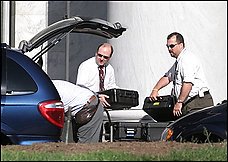
A federal judge in Washington has ruled that elected politicians are not above the law.
A federal judge in Washington ruled yesterday that the unprecedented FBI raid on Rep. William J. Jefferson's Capitol Hill office was constitutional, saying the government "demonstrated a compelling need to conduct the search" in the ongoing public corruption probe.
U.S. District Judge Thomas F. Hogan, in an anxiously awaited 28-page opinion, said politicians were not above the law, and he rejected arguments from the Louisiana Democrat that the search violated the Constitution's "speech or debate" clause, which protects speech and documents related to legislative activity.
"Congressman Jefferson's interpretation of the Speech or Debate privilege would have the effect of converting every congressional office into a taxpayer-subsidized sanctuary for crime," Hogan wrote, rejecting the request to return the seized materials.
Since March 2005, the FBI has been investigating allegations that Jefferson took hundreds of thousands of dollars in bribes in exchange for using his congressional influence to promote high-tech business ventures in Nigeria, Ghana and Cameroon.
In a sometimes scolding tone, Judge Hogan wrote that the warrant had not violated Mr. Jefferson's rights against unreasonable search and seizure, nor did it step on constitutional principles. "The facts and questions of law here are indeed unprecedented," the judge wrote. "It is well established, however, that a member of Congress is generally bound to the operation of the criminal laws as are ordinary persons."
Monday, July 10, 2006
State Dept. Lawyers Argued In Early 2002 Against Establishing "Lawless Universe" For Detainees

In early 2002, lawyers for the U.S. State Department were able to foresee specific legal objections to the Guantanamo detention regime -- including Common Article 3 violations of the Geneva Conventions.
The State Department lawyers were overruled by David Addington and crew.
David Bowker vividly remembers the first time he heard the phrase. A lawyer in the State Department, Bowker was part of a Bush administration "working group" assembled in the panicked aftermath of the September 11 attacks. Its task: figuring out what rights captured foreign fighters and terror suspects were entitled to while in U.S. custody. White House hard-liners, led by Vice President Dick Cheney and his uncompromising lawyer, David Addington, made it clear that there was only one acceptable answer. One day, Bowker recalls, a colleague explained the goal: to "find the legal equivalent of outer space" -- a "lawless" universe. As Bowker understood it, the idea was to create a system where detainees would have no legal rights and U.S courts would have no power to intervene....
The "outer space" line became something of a joke around the office, but Bowker and a handful of his colleagues didn't find it all that funny. The White House was already planning to fly terror suspects to Guantanamo Bay, Cuba, or other secret U.S. prisons overseas, where they would have no way to challenge their detention. In January 2002, Bowker and other State Department lawyers pushed back. After seeing a Justice Department memo arguing that Qaeda and Taliban prisoners did not even deserve basic protections under the Geneva Conventions, they warned that the administration was inviting an enormous backlash, both from U.S. courts and foreign allies. It would also, they feared, jeopardize President George W. Bush's plans to try such prisoners in specially created military courts. "Even those terrorists captured in Afghanistan ... are entitled to the fundamental humane treatment standards of ... the Geneva Conventions," William Howard Taft IV, the State Department legal counselor and Bowker's boss, wrote in a Jan. 23, 2002, memo obtained by NEWSWEEK. In particular, Taft argued, the United States has always followed one provision of the Geneva Conventions -- known as Common Article 3 -- which "provides the minimal standards" of treatment that even "terrorists captured in Afghanistan" deserve.
But the complaints went unheeded. The hard-liners forcefully argued that in wartime, the president had virtually unlimited powers to defend the nation. They may come to wish they'd listened a little more closely to the warnings. In a ruling late last month, the Supreme Court came down squarely on the side of the dissenters. The case involved Ahmed Hamdan, a captured 37-year-old Yemeni who once served as Osama bin Laden's driver and now sits in a Gitmo cell. The court blocked the Pentagon's plans to try Hamdan as a war criminal in a military commission authorized by President Bush. The court's reasoning was complex, but the majority opinion, written by Justice John Paul Stevens, concluded that the military commissions, with their limited protections for the rights of the accused, violated the Uniform Code of Military Justice and the basic provisions of Common Article 3 of the Geneva Conventions -- precisely the argument that Taft, Bowker and other State Department lawyers had tried to make four years ago.
Administration officials and Washington lawyers are still digesting the text of the ruling, but it is already becoming clear that it could have ripple effects that extend far beyond the trial of Hamdan and other Guantanamo prisoners. The president has long argued that Congress granted him wide-reaching powers in the days after 9/11, when it passed a resolution authorizing him to use military force against the perpetrators of the attacks. But in his ruling, Justice Stevens took a much narrower view of the president's wartime powers, rejecting the administration's argument that military commissions of the kind Bush had created were covered by the resolution. Now other antiterror programs that the president has justified by invoking the same congressional resolution might be vulnerable to serious legal challenge. Some legal scholars and current and former administration officials believe the case could undermine the secret foreign detention centers and the NSA eavesdropping program, two cornerstones of the terror war. "This is an extremely damaging decision for presidential power," says a former senior administration lawyer, who asked for anonymity owing to his intimate involvement in the legal wrangling over prisoner treatment. "And it was largely a self-inflicted wound." The bitter irony: an administration determined to expand executive power may have caused a serious contraction.
Sunday, July 09, 2006
Political Skullduggery Alleged In Mexico
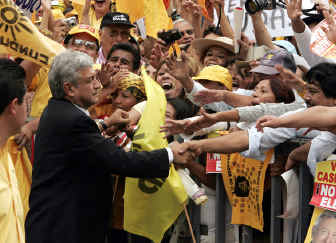
At least the Mexicans have the cojones to take to the streets when they realize that their presidential election has been stolen:
Downtown Mexico City swelled Saturday with the accumulated frustration and rage of the poor, who were stoked into a sign-waving, fist-pumping frenzy by new fraud allegations that failed populist candidate Andres Manuel Lopez Obrador hopes will overturn the results of Mexico's presidential election.
Lopez Obrador ignited the smoldering emotions of his followers Saturday morning, alleging for the first time that Mexico's electoral commission had rigged its computers before the July 2 election to ensure the half-percentage-point victory of Felipe Calderon, a champion of free trade. In a news conference before the rally, Lopez Obrador called Calderon "an employee" of Mexico's powerful upper classes and said a victory by his conservative opponent would be "morally impossible."
Lopez Obrador added a new layer of complexity to the crisis by saying he not only would challenge the results in the country's special elections court but also would attempt to have the election declared illegal by Mexico's Supreme Court. That strategy presages a constitutional confrontation because according to many legal experts the special elections court is the only body that can hear election challenges....
Lopez Obrador's approach pairs legal maneuvers with mass public pressure. On Saturday, he gave a mega-display of street power, drawing an estimated 280,000 people into the city center on a humid, drizzly afternoon, according to a Mexico City government estimate....
During his 40-minute address, Lopez Obrador stressed Mexico's class divide, accusing "powerful interests" of trying to deny democratic freedoms to "us, the poor." The crowd, which spilled into side streets off the square and may have been the largest of the presidential campaign, chanted, "Presidente, Presidente!"....
Lopez Obrador wants a vote-by-vote count, which would require opening sealed vote packets from more than 130,000 polling stations. Electoral commission officials have sided with Calderon's strategists, who argue that the law does not allow for the packets to be opened unless tally sheets attached to the packets appear to have been altered. Lopez Obrador said that only 2,600 vote packets were opened Tuesday and Wednesday during a marathon official count, which shrank Calderon's lead from 400,000 votes after a preliminary vote to 230,000....
The electoral institute will cede control of the election to Mexico's special elections court, which has until Sept. 6 to decide whether to certify the results. Calderon has not waited for the elections court, and neither have world leaders. He accepted congratulatory calls on Friday from President Bush and Canadian Prime Minister Stephen Harper. But Lopez Obrador cautioned against such formalities, saying, "Right now, there is no president-elect."
Lopez Obrador said the party of Calderon and President Vicente Fox had "learned fast" the dirty tricks used by the Institutional Revolutionary Party that ruled for 71 years until Fox toppled it in 2000 in Mexico's cleanest election to date.
He said count figures flashed on television had been rigged and were not consistent with the real vote count.
"The electronic counting system was manipulated. Mathematically, we have the proof of how the manipulation was done," he told foreign reporters. "What was on the screen did not always correspond to reality."
Saturday, July 08, 2006
Bush Spinning Supreme Court Ruling
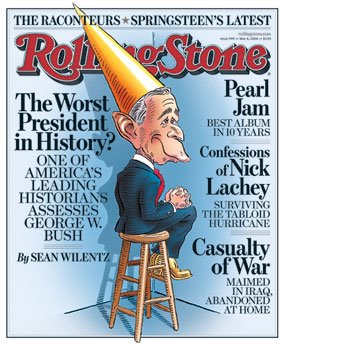
The following pronouncement looks like someone is trying to pull a fast one:
In his most detailed comments to date on the Supreme Court's rejection of his decision to put detainees on trial before military commissions, President Bush said Friday that the court had tacitly approved his use of the detention center at Guantanamo Bay, Cuba.
"It didn't say we couldn't have done -- couldn't have made that decision, see?" Mr. Bush said at a news conference in Chicago. "They were silent on whether or not Guantanamo -- whether or not we should have used Guantanamo. In other words, they accepted the use of Guantanamo, the decision I made."
Mr. Bush's remarks put a favorable spin on a ruling that has been widely interpreted as a rebuke of the administration's policies in the war on terror. The court, ruled broadly last week in Hamdan v. Rumsfeld that military commissions were unauthorized by statute and violated international law.
The question of whether Mr. Bush had properly used Guantanamo Bay to house detainees was not at issue in the case. At issue was whether the president could unilaterally establish military commissions with rights different from those allowed at a court-martial to try detainees for war crimes.
Friday, July 07, 2006
Chicago Patronage Chief Goes Down

Chicago's Democratic Party machine, which has suffered from ethical shortcomings for generations, is facing the scrutiny of "Plamegate" prosecutor Patrick J. Fitzgerald.
Mayor Richard M. Daley's former patronage chief broke the law by rigging city hiring decisions to reward loyal workers in Chicago's Democratic political machine, a federal jury concluded Thursday in a sharp blow to the five-term mayor.
In convicting Robert Sorich and three other onetime city officials, the jury rejected the defense claim that political favoritism in Chicago is hardly a crime. Instead, the 12 jurors agreed unanimously with prosecutors that Daley's aides cheated qualified workers and the taxpayers who paid their salaries.
"At bottom, this case was about a scam," First Assistant U.S. Attorney Gary Shapiro told reporters after the verdict, pointing to fraudulent job interviews, doctored documents and a far-reaching coverup. "This jury saw through their 'business-as-usual' defense."
Federal officials have signaled that the City Hall corruption investigation is not over.
"Stay tuned," more than one prosecutor has said in recent weeks. Daley, repeatedly mentioned in the Sorich trial by defense lawyers, has been interviewed by prosecutors but has not been charged...
The verdict is the second major victory against political corruption in three months for U.S. Attorney Patrick Fitzgerald, recruited in 2001 to challenge the machine politics for which the city and state are infamous. In April, jurors in the same Chicago federal courthouse convicted former governor George Ryan (R) of steering business to his friends and cash to his family, then lying to federal agents.
DeLay Must Stay On Ballot, Court Rules

Tom DeLay--the reluctant candidate--must remain on the ballot in Texas' 22nd District. Just where the Democrats want him. At least until an appeals court rules on the case.
A federal judge in Texas threw the political retirement of former House majority leader Tom DeLay into doubt yesterday, ruling that the Texas Republican Party must keep the indicted former congressman on the ballot for reelection this November.
For Democrats eager to seize control of the House this fall, the ruling was a significant victory. DeLay is under indictment on campaign finance charges in Texas and is under a cloud of scandal in Washington, and Democrats had hoped to wrest the conservative district from him. But DeLay seemed to thwart those designs in April, when he announced that he would resign from Congress and move his official residence to Alexandria from his suburban Houston district, making him ineligible to run for reelection.
Texas Democrats sued to keep him on the ballot, maintaining that state election laws say victors in a party primary must appear on the general election ballot unless they die or live outside the district on Election Day. They pointed out that DeLay still owns a Houston area home, where his wife, Christine, lives and where he still spends time.
In a strongly worded opinion, U.S. District Judge Sam Sparks sided with the Democrats...
Republicans are looking at the real possibility that the Democrats' seasoned nominee, former representative Nick Lampson, will be facing DeLay on the ballot. DeLay must decide whether he will campaign for the post he relinquished or almost certainly leave his party with one fewer seat in the House.
Reelection would bring its own problems. The House ethics committee announced in May that, had DeLay not announced his retirement, it would have launched an investigation into what it called "serious allegations" that he had participated in privately funded trips overseas. The Justice Department's sprawling corruption investigation stemming from the activities of former GOP lobbyist Jack Abramoff has yielded guilty pleas and the promise of cooperation from DeLay's former deputy chief of staff, Tony C. Rudy, and his former press secretary, Michael Scanlon.
Thursday, July 06, 2006
Copeland Lowery Failed To Report All Income
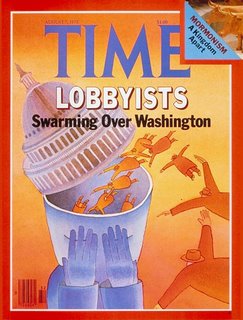
The lobby shop Copeland Lowery is back in the news.
A Washington lobbying firm at the center of a federal corruption probe failed to disclose at least $755,000 in income from 17 nonprofit organizations and governmental entities, and $635,000 from 18 other clients between 1998 and 2005, according to the firm's recently amended filings with the clerk of the House.
Lawyers for the Copeland Lowery Jacquez Denton & White firm say that the errors were inadvertent. But some experts have called them unusual and suggested that Copeland Lowery might have been trying to play down how much money it was paid by those who received federal grants the firm arranged, particularly the clients who paid its lobbying fees with tax-exempt or public funds.
Such payments to obtain "earmarks" -- a form of funding directed by language that lawmakers often insert in spending bills without hearings or competition -- have become increasingly common on Capitol Hill and increasingly controversial. Federal investigators have been probing whether there was a relationship between some of these earmarks and the campaign donations Copeland Lowery lobbyists made to House Appropriations Chairman Jerry Lewis (R-Calif.) and his committee colleagues.
The initial reporting errors had the effect of understating what Copeland Lowery received in lobbying fees from universities, health-care centers and municipal governments, among others. The reporting errors also understated what the lobbying firm received from private firms including ADCS Inc., owned by Brent R. Wilkes, a longtime Republican contributor also targeted in the federal probe...
Copeland Lowery was founded by a former colleague of Lewis, former representative Bill Lowery (R-Calif.), who withdrew in 1992 from a primary race against Cunningham after House records showed Lowery had written 300 overdraft checks on his House banking account. Last month, the firm's Democratic partners resigned, and Lowery and the remaining Republican partners renamed the firm Innovative Federal Strategies, a spokesman said.
Between 1997 and 2006, Lowery and his clients gave (former representative Randy "Duke" Cunningham's) political campaign committees $459,000 and Lewis's committees $917,000, according to a tally by the nonprofit Center for Responsive Politics.
Wednesday, July 05, 2006
Some Politicians Distancing Selves From Lieberman
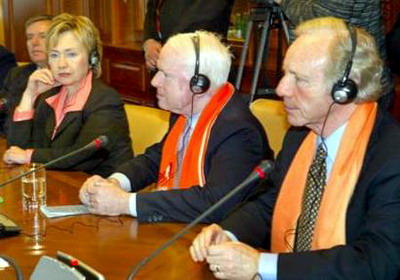
The spineless Democratic Senatorial Campaign Committee (DSCC) has been reluctant to criticize Sen. Joe Lieberman, whose allegiance to the party has been called into question by his "petitioning Democrat" charade of the past few days.
Russ Feingold announced last week that he would not campaign for Lieberman in the primary, but would support whoever wins the August 8 primary--but he was a lonely voice.
Now another prominent Democrat is distancing herself from the incumbent Connecticut Senator:
Sen. Hillary Rodham Clinton (N.Y.), a longtime supporter of Sen. Joseph I. Lieberman, said Tuesday that she will not back the Connecticut Democrat's bid for reelection if he loses their party's primary.
"I've known Joe Lieberman for more than 30 years. I have been pleased to support him in his campaign for reelection, and hope that he is our party's nominee," the former first lady said in a statement issued by aides.
"But I want to be clear that I will support the nominee chosen by Connecticut Democrats in their primary," Clinton added. "I believe in the Democratic Party, and I believe we must honor the decisions made by Democratic primary voters."
Facing a stronger-than-expected Democratic primary challenge from millionaire businessman Ned Lamont and sagging poll numbers because of his support of the Iraq war, Lieberman said Monday he will collect signatures to ensure a ballot spot as an independent for the November election if he loses the Aug. 8 primary.
It was good that she qualified her support for the odious Lieberman, but Sen. Clinton remains the dream choice of Republicans for the Democratic nomination for president in 2008.
Tuesday, July 04, 2006
New Waas Piece On Plamegate
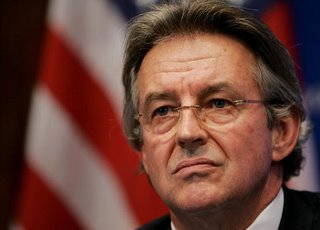
A new account by Murray Waas lends credence to the suspicion that the plan to discredit former ambassador Joseph Wilson came not only from Vice-President Cheney, but from President Bush himself.
Waas is careful, though, not to allege that either the president or the veep specifically authorized Scooter Libby to leak the name of Wilson's wife, CIA officer Valerie Plame.
They did, however, authorize leaking parts of the classified NIE on Iraq's WMD program, according to a court filing by special prosecutor Fitzgerald.
President Bush told the special prosecutor in the CIA leak case that he directed Vice President Dick Cheney to personally lead an effort to counter allegations made by former Ambassador Joseph C. Wilson IV that his administration had misrepresented intelligence information to make the case to go to war with Iraq, according to people familiar with the president's statement.
Bush also told federal prosecutors during his June 24, 2004, interview in the Oval Office that he had directed Cheney, as part of that broader effort, to disclose highly classified intelligence information that would not only defend his administration but also discredit Wilson, the sources said.
But Bush told investigators that he was unaware that Cheney had directed I. Lewis "Scooter" Libby, the vice president's chief of staff, to covertly leak the classified information to the media instead of releasing it to the public after undergoing the formal governmental declassification processes...
One senior government official familiar with the discussions between Bush and Cheney -- but who does not have firsthand knowledge of Bush's interview with prosecutors -- said that Bush told the vice president to "Get it out," or "Let's get this out," regarding information that administration officials believed would rebut Wilson's allegations and would discredit him.
A person with direct knowledge of Bush's interview refused to confirm that Bush used those words, but said that the first official's account was generally consistent with what Bush had told Special Prosecutor Patrick Fitzgerald.
Libby, in language strikingly similar to Bush's words, testified to the federal grand jury in the leak case that Cheney had told him to "get all the facts out" that would defend the administration and discredit Wilson. Portions of Libby's grand jury testimony were an exhibit in a recent court filing by Fitzgerald...
Cheney encouraged Libby to disclose portions of a then-still highly classified National Intelligence Estimate regarding Saddam's weapons-of-mass-destruction program, according to court records filed by Fitzgerald. One section of the report mentioned the Niger allegations as credible, and Cheney, Libby, and other senior administration officials wanted to demonstrate that the CIA's incorrect assessments were a reason why the administration was making its own claims about the Niger matter.
It remains interesting that Libby only leaked the portion of the NIE that suggested that Saddam had an ongoing WMD program, and refrained from providing the State Dept (INR) and DOE caveats in the NIE that said that the WMD suspicions were bunkum.
Monday, July 03, 2006
Skullduggery In "Corrupticut"

Lots of people go into politics these days for the right reasons.
To get free stuff.
There was the mayor who liked to be plied with $100-plus bottles of Bordeaux. The governor who took a free hot tub. The state senator who was given a job that paid $30,000 for doing nothing -- and then demanded a raise.
The past few years have revealed so many tales of graft, malfeasance and all-purpose criminality by public servants in Connecticut that it's hard to choose the most brazen. But for Kevin J. O'Connor, the U.S. attorney here, one moment stands out.
It came in June 2004, while then-Gov. John G. Rowland (R) -- he of the hot tub -- was facing impeachment in the legislature for improperly taking gifts. Even in that fraught time, O'Connor said, federal agents recorded state Sen. Ernest E. Newton II (D) -- he of the no-show job -- asking someone for a bribe.
"I thought to myself, you know, 'What are these people thinking?' " O'Connor said.
When Connecticut forefathers nicknamed their state "The Land of Steady Habits," this was probably not what they had in mind. But a tradition of bad behavior by officeholders persists here, despite numerous prosecutions and attempts at reform.
If more proof were needed, it has come in the past few weeks, with three new scandals involving current or former big-city mayors.
Sunday, July 02, 2006
Anthony Kennedy Now Sole Swing Vote On Court
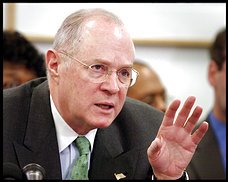
Today's entry does not involve skullduggery per se. It can be viewed instead as a general public affairs piece on the inner dynamics of the Roberts Court.
Justice Anthony M. Kennedy has emerged as the most important player -- the sole swing vote.
With the departure of centrist Justice Sandra Day O'Connor, the court is now frequently split between two four-justice liberal and conservative blocs, with Kennedy as the sole remaining swing voter.
An eclectic and sometimes inscrutable moderate conservative, Kennedy repeatedly cast the decisive vote on the most polarizing issues the court faced, from President Bush's military commissions, to the Clean Water Act, to the death penalty. He is poised to do so again next term when the court takes up the issues of abortion and school integration...
In the 17 cases during the 2005-2006 term that were decided by five-vote majorities, Kennedy was on the winning side 12 times, more than any other justice, according to figures compiled by the Supreme Court Institute.
In six of those cases, Kennedy voted with the conservative bloc, made up of Roberts, Alito, Antonin Scalia and Clarence Thomas. As a result, the court upheld most of Texas's Republican-drafted redistricting plan, restored the death penalty in Kansas, and ruled that police do not have to throw out evidence they gather in illegal no-knock searches.
But four times, Kennedy, a 1988 appointee of President Ronald Reagan, defected to the liberal justices, John Paul Stevens, David H. Souter, Ruth Bader Ginsburg and Stephen G. Breyer.
As a result, the court not only struck down Bush's military commissions, but also ruled that the police need permission from both occupants to search a home without a warrant, gave a Tennessee death row inmate a chance to win a new trial, and said that Texas violated the Voting Rights Act by diluting the voting power of Latino Democrats in one district. (Twice Kennedy was part of mixed left-right coalitions.) ...
The "swing voter" role is not entirely new to Kennedy, who has been in that position before, along with O'Connor.
Indeed, Kennedy is disliked by many conservatives because he has voted with liberals to uphold gay rights and abortion rights, and to strike down the juvenile death penalty.
But since O'Connor retired from the court Jan. 31, and Alito, who replaced her, has lived up to his conservative billing, Kennedy has been all alone as the swing voter -- with the added clout, and added pressure, that implies...
The pressure on Kennedy could mount next term, when the court will rule on the constitutionality of a federal law banning the procedure opponents call "partial birth" abortion, and will decide whether local governments may consider students' race when assigning them to public schools.
Though Kennedy is on record in favor of Roe v. Wade, the 1973 decision that recognized a right to abortion, he dissented angrily from a 5 to 4 ruling in 2000 that struck down a state law banning partial-birth abortion...
Kennedy has always voted against affirmative action, most recently in 2003 when he voted against race-conscious admissions policies at the University of Michigan's law school and undergraduate program.
Saturday, July 01, 2006
Ex-NYC Police Commissioner Kerik Pleads Guilty
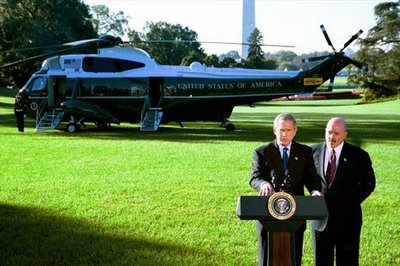
The ethically-challenged former New York City police commissioner Bernard Kerik might have been contractors' best friend if his nomination as head of the U.S. Department of Homeland Security hadn't been scotched soon after it was announced.
Yesterday, Kerik had a different kind of appointment. At the courthouse.
Bernard B. Kerik, whose rise from New York beat cop to head of the Department of Homeland Security was derailed by ethics questions, dodged prison Friday in a plea bargain by admitting he took $165,000 in gifts from a company attempting to do business with the city.
Kerik, at a 10-minute hearing in state Supreme Court in the Bronx, pleaded guilty to a pair of misdemeanors under a deal that allows him to continue without interruption his new career as a Middle East security consultant.
Kerik acknowledged accepting renovations on his Bronx apartment from a company attempting to land city contracts -- Interstate Industrial Corp., a business reputedly linked to organized crime. And he admitted failing to report a $28,000 loan from a real estate developer, as required by city law.
Under the plea, Mr. Kerik, who has a security consulting business, will pay $221,000 in fines and penalties...
Among the more surprising aspects of Mr. Kerik's case has been the disclosure that much of the information about his ties to Interstate was known by lawyers inside the Department of Investigation, but it never affected his closely contested candidacy for police commissioner in 2000. At the time, the lawyers knew that Interstate's owners, whom it was investigating for ties to organized crime, had established a relationship with him and had hired his brother and the best man at his wedding.
The agency learned of the relationship in June 2000, and the commissioner at the time, Edward J. Kuriansky, talked to Mr. Kerik about it, officials have said.
Asked if the facts known in 2000 had ever been passed along to Mr. Giuliani, who has said he was never told about Mr. Kerik's relationship with the company, (Commissioner Rose Gill Hearn of the city's Department of Investigation) did not answer directly. But instead, she said through a spokeswoman that Mr. Kuriansky went to meetings with the mayor and his senior staff every day.


